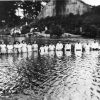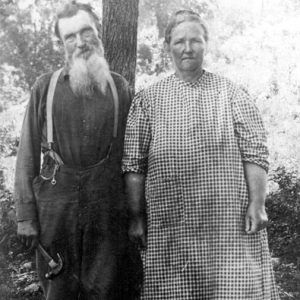calsfoundation@cals.org
"Preacher" Doke (1833–1919)
aka: Nathaniel Mattox Doke
Nathaniel Mattox “Preacher” Doke was a Benton County pioneer, evangelist, entrepreneur, and benefactor. The Methodist exhorter “talked from his heels” in a sincere, convincing manner and was also a master carpenter, blacksmith, farmer, hunter, and fiddler. By the turn of the century, he had married for the third time and fathered a total of twenty-three children. Doke taught his children the same self-sufficient skills he had learned and encouraged them to improve their minds by reading as he had done.
“Preacher” Doke was born on December 9, 1833, near Terre Haute in Washington County, Indiana, to Samuel Doke and Mary Mattox. To support the family, Nathaniel and his older brother William worked in a Terre Haute packing house and a tannery, then opened a leather and shoe shop, where William made fine boots and Nathaniel turned out work shoes.
Doke married Matilda Gaer Ballard on October 24, 1855, at Marshalltown, Iowa. They had four children before Doke became a private in Company F of the 149th Indiana Volunteer Infantry on February 10, 1865. Four months later, he received a medical discharge at Huntsville, Alabama, for “disability due to disease of lungs from bronchitis and exposure to cold at Indianapolis.” He was described as blue eyed, light haired, and five feet, nine inches tall. Matilda bore one child in 1867, then two more children in Clay County, Iowa, and she died there on October 6, 1868. Doke, a Methodist, had shown a talent for preaching and officiated for the next eleven years in the Terre Haute area.
Doke farmed for most of his life. He was unusually knowledgeable, and he promoted education in a time and in places where physical strength, independence, and self-sufficiency were valued above reading and writing. Widely respected for his generosity, industry, honesty, advanced thinking, and strength of character and body, he preferred peaceful solutions to conflicts. When they failed, one Indiana friend described him as “the quickest man with his fists he had ever seen.”
Doke married Charlotte House, age sixteen, on November 6, 1869, at Bloomfield, Indiana, and she bore six children. In 1880, they moved to the Ozark wilderness west of Seligman in southwestern Missouri, where Doke continued farming and ministering, always clad in a formal black Prince Albert coat. He never charged for his services. Charlotte died at the family home there on September 15, 1883.
On October 22, 1884, Doke married Eliza Ellen Baldridge, twenty-three years old, at Seligman, Missouri. In the mid-1880s, the family moved to Benton County, Arkansas, to the remote Pine Log area in Garfield Township. Ellen bore ten children over the next fifteen years. Doke furnished the logs and helped build Pine Log Elementary School No. 111, the first school in the rugged area immediately west of the White River. He was also the first teacher there as well as a school board member, and he bought and installed the school’s first heating stove.
The St. Louis–San Francisco Railway (Frisco) had built into northwestern Arkansas around 1881, establishing a station at Garfield (Benton County) west of the Pine Log settlement. About 1899, the Dokes moved to 200 acres on Garfield Mountain just east of the railroad tracks so that the younger children could attend Garfield elementary school.
The St. Louis Post-Dispatch published a feature story on “Preacher Doke” on March 11, 1900, describing him as a “Quaint Arkansan,” though his listed accomplishments show him as much more. Besides marrying many couples in that sparsely populated part of the Ozarks, he used progressive farming methods to produce and ship high grade strawberries, peaches, cashmere wool, and other cash crops to the St. Louis markets by rail. Among Doke’s most successful projects were large peach and apple orchards and a herd of Jersey dairy cattle, the first in Benton County. According to Doke’s youngest son, called Peter C., their father often engaged the children in spelling bees, athletic contests and foot races, string and brass band practices, and singing sessions. The boys also helped clear oak, hickory, and other trees from the mountainside; a photo circa 1904 shows the Doke house surrounded by several acres of stumps.
Doke never turned anyone away hungry or empty-handed, often inviting friends, neighbors, and even entire congregations to his home for Sunday dinner, sometimes accommodating up to forty guests. To accomplish this, his family put up a good portion of their annual crops and raised, slaughtered, and processed two to three dozen hogs every year. He also donated land near the the Frisco tracks for a Church of Christ, hauled the lumber for the structure from Eureka Springs (Carroll County), and helped with construction. The building was later converted to a home.
Though partially deaf, Doke often walked the Frisco tracks into town, reading as he went. After several close calls, a train struck and killed him on May 27, 1919. He is buried in Ruddick Cemetery near Garfield.
For additional information:
Doke, E. Reed. “Nathaniel Mattox Doke, December 9, 1833–May 27, 1919.” Benton County Pioneer 56, no. 4 (2011): 8–19.
———. “Preacher Doke.” West Fork, AR: Privately published, 2000.
Jines, Billie Allen. Benton County Schools that Were. Pea Ridge: B. Jines, 1989.
Obituary of N. M. Doke. Rogers Democrat, May 29, 1919.
“Preacher Doke is a Farmer, Blacksmith, etc.” St. Louis Post-Dispatch, March 11, 1900.
Kate Baird Anderson
Bentonville, Arkansas
 Early Twentieth Century, 1901 through 1940
Early Twentieth Century, 1901 through 1940 Religion
Religion Preacher Doke and Wife
Preacher Doke and Wife 



Comments
No comments on this entry yet.